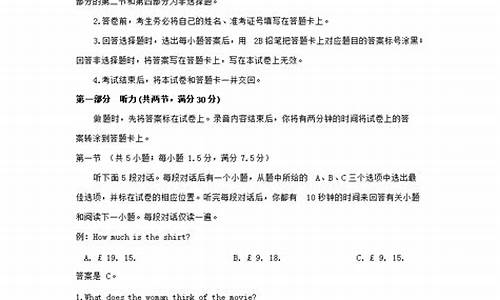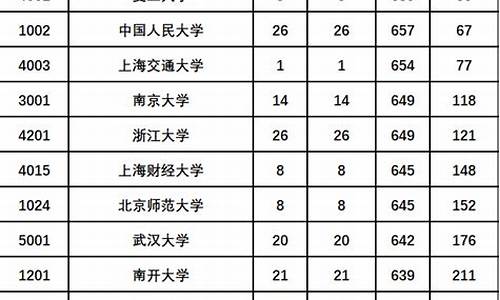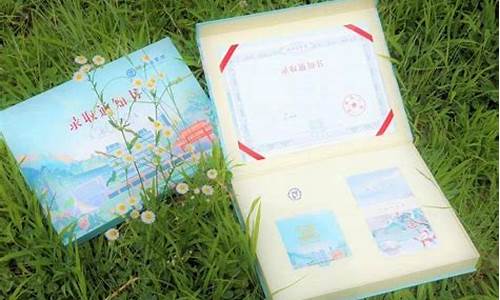您现在的位置是: 首页 > 热门专业 热门专业
2017年安徽省高考试卷_2017安徽省高考英语
tamoadmin 2024-05-29 人已围观
简介1.历年安徽高考文科状元各科分数2.英语2017高考调研答案3.高考英语阅读理解训练4.2017年高考英语全国卷1 - 阅读理解B5.如何评价2017年高考全国卷一英语 2017必背高考英语3500词 《高考英语3500词》是2008年中国社会出版社出版的图书,收录了新课标和高考大纲要求掌握的全部词汇。下面是我整理的以A开头的英语词汇,欢迎阅读!
1.历年安徽高考文科状元各科分数
2.英语2017高考调研答案
3.高考英语阅读理解训练
4.2017年高考英语全国卷1 - 阅读理解B
5.如何评价2017年高考全国卷一英语

2017必背高考英语3500词
《高考英语3500词》是2008年中国社会出版社出版的图书,收录了新课标和高考大纲要求掌握的全部词汇。下面是我整理的以A开头的英语词汇,欢迎阅读!
2017必背高考英语3500词A
1.●abandon v. 放弃,遗弃,抛弃 abandon the baby/ child/ friend
abandon the plan/ idea/ effort/ hope
abandon oneself to 陷入,沉湎于 He abandoned himself to despair.
2. ◎ability n. 能力; 才能 the ability to walk 行走的能力
to the best of one?s ability 竭尽全力 He completed the job to the best of his ability.
3.●abnormal adj.不正常的,畸形的,反常的 They thought his behavior was abnormal.
反义词:normal
4. ◎aboard prep. adv.在船(飞机,火车)上,上船(飞机,轮船)
all the people aboard 机上的人
5. about prep关于,ad 大约,到处
a) be about to do sth?(when) I was about to go out when it began to rain.
b) look about/around/round c) How/What about?询问情况或建议
6 . above prep 在?上面 above all 首先;尤其
7. abroad ad.到(在)国外 a) go /study /live abroad b) at home and abroad在国内外
8. ●absence n. 不在,缺席
absence from work/ school The decision was made in my absence.
in the absence of 在缺少?条件下 The case was dismissed in the absence of proof.
9. ◎absent adj. 缺席的,不在的 be absent from absent-minded adj. 心不在焉的
10. ◎absorb vt. 1) 吸收,吸进(液体,气体等) 2) 理解,掌握
absorb ink/ water/ neat/ light/ oxygen/ sound/ energy
absorb information/ knowledge be absorbed in 专注于,聚精会神于?
11.●abuse v / n. 滥用,谩骂 abuse alcohol/ drugs 酗酒 /嗜毒
abuse power/ position/ privilege 滥用权力/职权/特权
12. accept vt.
accept the gift /invitation /plan accept sb/sth as?
13.●access n.方法,通路,机会
The only access to the farm was a narrow bridge.
Only high officials have access to the emperor.
We students have access to the school library.
accessible adj. 可进入的,可接近的,可使用的
Such information is not easily accessible to the public.
14. accident n.事故,意外的事
by accident/chance 偶然,无意中;不小心
15. ●accompany v. 陪伴,伴随,伴奏 accompany sb. to the school/ supermarket
accompany the singer on / at the piano Lightening usually accompanies thunder.
16. ●accomplish v. 完成,到达,实现 accomplishment n. 成就,成绩
accomplish the task/ purpose/ goal
17. according to 根据 According to the law, he should be sentenced to death.
18. ◎accuse vt. 指控,指责 accuse sb of (doing ) sth 控告?
19.● accustomed adj. 习惯的.,适应的,惯常的
be/ get/ become accustomed to doing He was soon accustomed to getting up early.
20. ache vi./n headache / toothache My back aches so much.
21. achieve vt 达到;取得 achievement n 成就
achieve success/victory/one?s goal;
22.◎achievement n. 成就,业绩;完成(任务等) make great achievements
23.●acknowledge v. 承认,致谢
It is generally acknowledged that global warming is caused by greenhouse gases.
Yaoming is acknowledged as/ to be the best player in China.
I acknowledged financial support from the local government.
24. across prep cross v. I walked across the street.; cross a street; come/run across碰到
25. act n.法令,条例 vt.表演,扮演,行动,做事
act as 充当;扮演 act out 把?表演出来
26. action n. 行动 take action to do sth put sth into action 把?付诸实施
27. active adj. 积极的;主动的 take an active part in /be active in 积极参加
28.◎activity n. 活动 outdoor activities 户外运动
29.actual a.实际的 actually adv. in (actual) fact 实际上
30●adapt vi. 适应,适合,改编 vt. 使适应 adapt to change /the city life
adapt oneself to the new surroundings adapt the novel for a film adaptation n. 适应
31. add vt 添加,增加,补充说(that)
add(?)to 添加 add up 把?加在一起 add up to总计为; 总数为
a) His illness added to our trouble. b) He added that he would come again.
c) Please add these figures up. d) These numbers add up to 100.
e) He added some salt to the water.
32. address n.地址 vt.写地址;向?讲话(尤指演讲)
address the letter to sb. 给某人寄信 The letter was wrongly addressed.
The president addressed the public.
33.●adjust vt. 调整,调节,适应 adjust your speed /the volume/ the camera
adjust to the dark/ the single life adjust yourself to the student life adjustment n. 调整,调节
34. admire v 钦佩.;羡慕
admire sb for sth I admire John for his courage.
35. admit vt (admitted ,admitted)
1) 承认 admit one?s mistakes; admit doing/having done
He admitted having stolen the money.
2) 准许(入场,入学,入会) admit sb to /into?sb be admitted to
He has been admitted to Beijing University.
36.●adopt v. 收养,采用,采纳
adopt a child the adopted son/ daughter
adopt a new policy/ a suggestion/ a plan/ an attitude
37. advance vi推进,促进;前进 adj. advanced 先进的/ 高级的
in advance 预先,事先 an advanced worker
38. advantage n. 优点,好处(可数名词) 反:disadvantage
take advantage of 利用 have an advantage over 优于? to sb?s advantage 对(某人)有利
39. ◎advertise vt. 为?做广告
1)为?做广告 advertise a product / things
2)登广告征求/寻找? advertise for a new sales manager
40. advice n/u. advise vt. 忠告,劝告,建议 take/follow/ accept one?s advice 接受某人的建议
ask sb for advice 向某人寻求建议 a piece of advice 一条建议
give sb some advice on sth
advise sb (not) to do; advise doing; advise that ?(should)+do
Our teacher advised that we should study hard.
41. ●affect vt. 影响, 深深打动,使悲伤等
Smoking affects health. People were deeply affected by the death of Jin Zhengri.
42. afford vt. 负担得起,抽得出(时间); 提供
can/could/be able to afford sth/to do sth I can?t afford a book/to buy the book
43. afraid a. 害怕的;担心
be afraid to do 因为害怕不敢做?; be afraid of doing 害怕?
She was afraid to go out alone at night. She was afraid of waking him up.
44. against prep 对着,反对, 靠着,迎着,衬着
stand against the wall (靠墙站着) go against nature; be against sth 反对
They are strongly against the plan. The pine tree were black against the morning sky.
45. age n.年龄;时代 vi. 变老 for ages 多年; at an early age; at the age of ? ;
of the same age=of an age After his wife?s death he aged quickly.
46. agree vi. 同意;应允
1)agree with ① agree with sb / what you say/your opinion.
②表示一致;? (食物、天气、工作等)对?适宜?:
The weather does not agree with me. 这种天气对我不适宜。
A verb must agree with its subject in person and number.
What he does does not agree with what he says. 他言行不一致。
2)agree to the plan/ the arrangement/ the suggestion .
3)agree on /upon主要指双/多方通过协商而取得一致意见或达成协议:
We agreed on the price. 我们就价格达成了一致意见。
Both sides agreed on these terms. 双方都同意这些条件。
4) agree to do sth He agreed to go with us. 他同意同我们去。
5) reach/arrive at/come to an agreement 6) I can?t/couldn?t agree more.
47. ahead ad. 在前,向前 ahead of time 提前 go ahead 前进,干吧,说吧
48.◎aid n. 援助;救护;辅助工具
first aid 急救 in aid of 支持
by ( the) aid of 借助于,通过?的帮助 come/ go to one?s aid 帮助某人
v. 帮助,促进 aid (sb/ sth) in/ with ( doing) sth 帮助某人做?
49. aim at
① 瞄准,对准 He aimed the gun at the enemy officer.
② (向某方面)努力 She's aiming at ( trying to win) a scholarship.
③ 针对某人 My words were not aimed at you.
50.◎alike adj. 相像,十分相似 We are alike in many ways.
adv. 相似的,相同的 They tried to treat their children alike.
51. alive a. 活着的,存在的 catch ?alive 活捉 keep?alive be alive with= be full of
The lake was alive with fish. Who is the greatest man alive.(后置定语)
52. allow v 准许,允许 allow doing/ sb to do
allow for 把 考虑进去 Has everything been allowed for in your plan?
53. almost adv几乎,差不多
Almost no one/nobody came to the party. There was almost no snow that winter.
54. alone adj/adv 单独的 孤独的
1) 形容词She is alone at home. (她独自一人在家。)
2) 副词I like to work alone. (我喜欢独自一人工作。)
3) ?只有,仅仅?, The shoes alone cost $200. ※ let /leave sb /sth alone 别打扰
let alone 更不用说
★ lonely
1) 定语, ?孤单的,无伴侣的,无人烟的,荒凉的,偏僻的? a lonely man / island.
2) 表语,?孤寂的,寂寞的? feel lonely ※ He lives alone but he doesn?t feel lonely.
55. aloud ad.大声地 read aloud/ think aloud
56. ◎amaze vt. 使惊奇,惊叹;震惊
What amazes me is how long she managed to hide it from us.
It amazed me that he could be so calm at such a time.
amazed adj. 惊奇的,惊讶的 amazing adj.令人惊奇的,惊叹的;震惊的
I? m ___ that you have never heard of the Rolling Stones.
It?s ____ how often you see drivers using mobile phones.
57. ◎ amount n. 数额(尤指数量,大小等) a large amount of +u/n
large amounts of +u/n v. (数量,意义等) 等同,相当于 amount to
1) (数量上)达到,总计
Time lost through illness amounts to 1,357 working days.因疾病而损失的时间总共为
2)等于,意味着
Ultimately, their ideas amount to the same thing. 归根结底,他们想的都是一回事。
58. ● amuse vt. 使快乐,逗乐amuse sb. 使?高兴 The funny drawings amused the kids.
be amused by/at/ with 被?逗乐 amuse oneself 自娱自乐
The boys amused themselves by drawing. amusement n. to one?s amusement
59. ◎amusement n. 1) 娱乐,乐趣 to one?s amusement 让某人发笑
They were dancing and singing in the car, much to the amusement of passers-by.
他们在车里跳舞,唱歌,让路人感到十分有趣。
2) 娱乐活动,消遣活动 amusements amuse vt. amuse sb/ oneself 使开心,逗笑
amused / amusing adj. an amused smile / look/ expression 愉快的微笑/ 神情/ 表情
an amusing story/ film 有趣的,好笑的,逗人发笑的故事/ **
60. angry adj 生气的,愤怒的 (angrily /angrier )
be angry at (about) 因为?而生气 be angry with sb 生某人的气
61. announce vt. 宣布,宣告,公布
announce a decision / plan/ intention announce sth to sb announce that
At the end of the meeting , it was announced that an agreement had been reached.
make an announcement
62.◎announcement n. 通告,通知
63.◎annoy vt. (使)烦恼 be annoyed with sb.for (at) sth.
What annoyed him most was that he had received no apology.
annoyed adj. 略感烦恼(生气)的 annoying adj. 讨厌的,令人烦恼的
It?s _____that we didn?t know about this before.令人恼火的事,我们事先并不知道这一切
Mr Davies was ____that the books were missing.戴维斯先生生气了,因为那些书不见了。
64. answer n. the answer to the question v. answer a question/the door/the phone;
answer for 对? 负责 You will have to answer for your wrong doing one day.
65. ◎anxiety n. 忧虑,焦急,担心
anxious adj. 焦虑的,不安的;担心的 be anxious about sth for sb
渴望的,急切的 be anxious to do sth
67. ◎apologize n. 道歉,歉意 apology n.
make an apology/ apologies to sb for sth apologise to sb for sth
68. ●appeal v. n. 吸引,呼吁,恳求
The design has appealed to people of all ages. I appeal to you to protect the environment.
have/ hold appeal for sb. 对某人有吸引力 lose one?s appeal 失去吸引力
69. appear 1) vi. 出现,露面 The man suddenly ______ from behind the tree scared me.
2) 系动词 似乎,好像 appear+ (to be) + n/adj 似乎
It appears (to sb) that /as if He appeared to be happy in the news.
It appears to me that he will win
It appears that all the files have been deleted.档案好像都已经被删除了。
Police say there appear to be signs of a break-in.警方称似乎有破门而入的迹象。
70. ◎appearance n. 出现,露面;容貌 judge by appearances 以貌取人
71.◎application n.申请 make an application for
72. apply v. 申请 apply for 申请;请求,接洽
apply sth to ?运用,应用 apply oneself to 致力于,集中精力做某事
73. ●appoint vt. 任命,委派,安排,确定
1) 任命,委派A committee was appointed to consider the plan. 一个委员会被指定去研究这些计划。 He was appointed as chairman.
2). 约定,确定 Everyone got there at the appointed time.
In the evening he made his way to the appointed meeting place.
74. appointment n.
make an appointment 约定、会 his appointment as president 他担任总统的任命
75. ◎appreciate vt. 欣赏;感激 appreciate your concern appreciate doing sth
appreciate your abilities/ fine works of art I?d appreciate it if you let me get on with my job.
76. ◎approach 1). v. 接近;靠近;走进
As they approached the wood, a rabbit ran out of the trees.
I find him difficult to approach. The winter vacation is approaching.
2). n. 接近;方法;途径;通路
He decided to adopt a different approach and teach the Bible through story-telling.
His approach to the problem are wrong. All the approach to the palace were guarded by troops.
77. ●approve vi. 赞成 vt. 同意,批准 approve of 赞成,同意 approve of one?s idea
He doesn?t approve of my leaving this year. approve the plan/ proposal 通过计划/ 提议
approval n.
79. argue vi. 争辩,争论 n. argument 1) argue for /against 赞成/反对
2) argue sb into/out of doing sth 说服某人做/不做某事
3) argue with sb about sth 与某人争论某事
80. ◎arise arose arisen vi. 1) 出现,发生,产生 A new crisis has arisen. 新危机出现。
2)起床,起身,起立 He arose at dawn. 他黎明即起。
81.◎argument n. 1)争论,辩论 have an argument with sb about / over sth
2) 论点,论据 a powerful argument against smoking argue v. argue with sb about / over sth
82. arm
n. 手臂,支架 武器(复) arm in arm 手挽手 take up arms 拿起武器
vt. 以?装备,武装起来 arm?with?
Armed with the new equipment, the explorers entered the cave. be armed to the teeth 全副武装
83. around 在周围; 在附近; 大约
around the corner 在拐角处,即将到来 around the clock 昼夜不停地
84.◎arrange vt. 安排,布置
arrange an appointment 安排预约 Have you arranged to meet Mark this weekend?
We had arranged that I would go for the weekend.我们商量好了,这个周末我去。
He arrived as arranged. 他如约而至。
The company will arrange for a taxi to meet you at the airport.
Dave arranged for someone to drive him home.
arrangement n. 安排,布置 make arrangements for?
85.◎arrest vt. 逮捕,拘捕 He got arrested for careless driving.
n. put / place sb under arrest 逮捕某人
86. arrive v arrival n. 到来;达到 arrive at Guests receive dinner on/upon their arrival
87. article n. 文章;东西;物品;冠词 an article of clothing 一件衣服
88. ashamed adj 惭愧,害臊
89. asleep adj 睡着的,熟睡 (表语形容词) fall asleep 入睡 He seems to be fast asleep.
90. ●assist v. 帮助,协助 assist sb. in dong /with sth.
we?ll assist you in finding a place to live.
She employed a woman to assist her with the housework.
assistance n. technical/ military assistance 技术/军事援助
91. ●assume v. 假定,假设 It is assumed that?普遍认为
I had assumed him to be a teacher. 我本以为他是老师。
He assumed an air of concern. 他装出关心的样子。 assuming (that)? 假设,假如
92. assumption n.
a) be ashamed of 以为是耻辱 b) be ashamed of oneself for 为?而害羞
c) feel ashamed for sb 替某人感到羞愧 ※ ashamed & shameful
ashamed指事物使人感到羞耻、惭愧、害臊;
shameful指事物或本身可耻不道德。 He is ashamed of his shameful conduct.
93. astonish v 使惊讶 astonished /astonishing
be/look astonished at 对?感到大吃一惊 an astonished look
94. attach attach ?to
95. attempt v. 试图,尝试
attempt to do He was charged with attempting to kill his wife.
attempt sth The plane crashed while attempting an emergency landing.
n. make an attempt to do /at doing 试图做某事
96. attend v. 看护,照料,服侍;出席,参加 attend a meeting/ school/ church/ the concert
attend to sth处理,注意 I have a few other things to attend to.
attend to sb 看护 attend to a baby
97. attention n. 注意,关心
pay ( much/no/little) attention to draw one?s attention to
fix one?s attention/mind/eyes on; attract one?s attention
98. attract v. 吸引,引起 Like attracts like 物以类聚
99. available
100. average adj 平均的;普通的 n. 平均数 on (the)average 按平均
I was just an average sort of student. 我只是一个普通学生。
101. avoid doing
102. awake v. 唤醒;(awoke/ awoken) Is he awake or asleep? awake to sth 意识到 醒悟到
It took her some time to awake to the dangers of her situation. adj 醒着的be wide awake
103. award n. v.
104. aware be aware of
105. away adv离开;远离 keep away from 保持距离; far away 在远处
right away 立刻,马上; give away 泄露,赠送
106. awful
adj.可怕的; 糟糕的; 非常的; 极坏的;
adv.非常,极;
;历年安徽高考文科状元各科分数
1,背作文模版,不会写的单词只要求会认识就够了,从考试试卷阅读里找要用的单词
2,尽量补语法,搞明白5种基本句型,熟练掌握make,have ,do ,get,keep,stop 这几个动词
3,客观题重点抓分在单选题和完形填空,认识单词,有个印象,记下词性及其意思,反复看错题。同义词辨析的单选题直接放弃,随便选。完形填空出现模棱两可例如,A或D中选A B或C中选B A或C中选C,B或D中选D
英语2017高考调研答案
2019年安徽省高考文科第一名:来自合肥一六八中学的刘鑫同学,681分。
2018年安徽省高考文科状元:合肥一中郑辰筱,总分678分:语文123分,数学147分,外语143分,文综265分。
2017年安徽省高考状元:
文科状元:潘宇昂毕业于合肥168中学,662分夺头名。
理科最状元:黄杨光同学,来自合肥八中,高分706分。
据了解,2017年高考文科600分以上的有916人,最高分662分;理科600分以上的有5386人,最高分706分。
2012年安徽省高考状元:?
文科状元——倪惠;高考成绩:671;出自:淮北一中;
理科状元——丁雅琦;高考成绩:704;出自——芜湖一中。
2011年安徽省高考状元:?
文科状元——丁洁;高考成绩:646;出自:淮北一中;
理科状元——张泽;高考成绩:699。
高考英语阅读理解训练
Ⅰ. 1. tutor 2. original 3. upset 4. argued 5. pushy
6. enough 7. style 8. matter 9. compare 10. complained
Ⅱ. 11. surprises 12. except 13. fail 14. pressure 15. compare 16. don’t have enough money 17. what should I do/what to do next 18. ask your teacher for help 19. argue with each other for money 20. from a young age
Ⅲ. 21. more 22. sandwiches 23. was invited 24. interested 25. dancing 26. different 27. friend’s 28. to buy 29. really 30. carefully
Ⅳ. 31. D 32. A 33. C 34. A 35. D 36. A 37. A 38. B
39. C 40. D 41. B 42. A 43. A 44. A 45. C
Ⅴ. 46. do you 47. doesn’t need any 48. the same age as 49. should not , either 50. what to do
Ⅵ. 51-55 C B A D B 56-60 B A D A D
Ⅶ A. 61-65 A A D A C B.66 friends 67informtion 68quickly 69eyes 70correctly
2017年高考英语全国卷1 - 阅读理解B
高考英语阅读理解精品训练2017
近几年高考英语阅读主要有猜测词义、理解主旨大意、推理判断、对文章的细节理解、 数据推算等几种题型。为了帮助大家备考高考英语阅读理解题,我分享了一些高考英语阅读理解练习,希望能对大家有所帮助!
阅读理解练习1
Not many years ago, a wealthy and rather strange old man named Johnson lived alone in a village in the south of England. He had made a lot of money in trading with foreign countries. When he was seventy?five, he gave ? 12,000 to the village school to buy land and equipment (设备) for a children?s playground.
As a result of his kindness, many people came to visit him. Among them was a newspaperman. During their talk, Johnson remarked that he was seventy-five and expected to live to be a hundred. The newspaperman asked him how he managed to be healthy at seventy?five. Johnson had a sense of humour (幽默). He liked whisky (威士忌酒) and drank some each day. ?I have an injection (注射) in my neck each evening.?he told the newspaperman, thinking of his evening glass of whisky.
The newspaperman did not understand what Johnson meant. In his newspaper he reported that Johnson was seventy?five and had a daily injection in his neck. Within a week Johnson received thousands of letters from all over Britain, asking him for the secret of his daily injection.
1. Johnson became a rich man through
A. doing business. B. making whisky. C. cheating. D. buying and selling land.
2. The gift of money to the school suggests that Johnson
A. had no children. B. was a strange man.
C. was very fond of children. D. wanted people to know how rich he was.
3. Many people wrote to Johnson to find out
A. what kind of whisky he had. B. how to live longer.
C. how to become wealthy. D. in which part of the neck to have an injection.
4. The newspaperman
A. should have reported what Johnson had told him.
B. shouldn?t have asked Johnson what injection he had.
C. was eager to live a long life.
D. should have found out what Johnson really meant.
5. When Johnson said he had an injection in his neck each evening, he really meant that
A. he liked drinking a glass of whisky in the evening.
B. he needed an injection in the neck.
C. a daily injection in the evening would make him sleep well.
D. there was something wrong with his neck.
阅读理解练习2?I?m very tired from working here,?said Jean to her friend Kate,? I?m on my feet from morning to night. For the first quarter of the day, I clean up the counter (柜台) and set the tables. For the next quarter, I help in the kitchen. For the second half of my workday, I take orders at the counters.?
?Kate, I wish I had your job,?Jean went on. ?For four hours you just sit at the cash register (收款台) taking in money.?
?But I spend two more hours in the kitchen (厨房) than you do,?said Kate. ?It?s tiring to cook over a hot stove. I don?t think you?d really want my job. In fact, I?d like your job.?
1. Both Jean and Kate probably work in a
A. hotel B. library C. lab D. shop
2. How long did they work every day?
A. eight hours B. twelve hours. C. Ten hours D. Nine hours
3. How long did Kate spend in the kitchen?
A. a quarter day. B. A half day. C. One-third day. D. Three-fourths day.
4. From this passage we can see that
A. they are both interested in their work. B. their work is neither tiring nor busy.
C. both of them are tired of their work. D. they?ve decided to give up their work.
5. Give a proper proverb (谚语) to Jean and Kate.
A. It?s never too late to learn.
B. It?s no use crying over spilt milk.
C. The grass is always greener on the other side.
D. One swallow(燕子) does not make a summer.
阅读理解练习3In 1985 a French television company sent its reporters to the Paris Metro. They took cameras to see what passengers would do if they saw someone attached on the platform or in the trains. They acted out incidents. The incidents looked real but they were all done with the help of actors. However, very few people tried to help, and most passengers pretended not to notice. in one incident, a foreigner was attacked by three men. The attack was on a train which was quite full, and although one man tried to get the passengers to help, they all refused. It seems that such behaviour(行为) is not unusual, but the question is why? Is it a problem of big cities, or would the same thing happen anywhere? To discuss these questions, we have in the studio(演播室) Professor Wilson, who is an expert on the subject?
1. Who did the experiment?
A. A French television company. B. The Paris Metro.
C. The City Government of Paris. D. Professor Wilson.
2. What did the experiment try to find out?
A. How a foreigner was attacked on the train.
B. How passengers helped each other on the platform.
C. Passengers? reactions towards incidents.
D. Actors? performances during incidents.
3. What was the finding of the experiment?
A. Passengers helped a lot during incidents.
B. Very few foreigners were on the train.
C. Very few passengers tried to help during incidents.
D. Some people were good at acting on the train.
4. Who do the underlined words one man refer to?
A. One of the three men who attacked a foreigner.
B. One of the actors who took part in the experiment.
C. One of the passengers who were on the train.
D. One of the reporters who were sent to the Paris Metro.
参考答案:
1A 2 C 3 D 4 D 5 A
1A 2 A 3 B 4 C 5 C
1D 2 C 3 C 4 B
;如何评价2017年高考全国卷一英语
I work with Volunteers for Wildlife, a rescue and education organization at Bailey Arboretum in LocustValley. Trying to help injured, displaced or sick creatures can be heartbreaking; survival is never certain. However, when it works, it is simply beautiful.
我在“野生动物志愿者”组织工作,这是蝗虫谷贝利植物园的一个援救教育组织,帮助受伤、流离失所或生病的动物。这样的工作可能会令人心碎;因为无法确定动物是否能活下来。然而,当救援起作用时,这种感觉真的很棒!
I got a rescue call from a woman in Muttontown. She had found a young owl on the ground. When I arrived, I saw a 2-to 3-week-old owl. It had already been placed in a carrier for safety.
我接到马特顿镇一位女士的求救电话,她在地上发现了一只猫头鹰幼鸟。当我到达时,我看见了一只两三周大的猫头鹰。为了安全起见,它已经被放在一辆大货车上。
I examined the chick and it seemed fine. If I could locate the nest, I might have been able to put it back, but no luck. My next work was to construct a nest and anchor it in a tree.
我检查了这只幼鸟,看起来还不错。如果我能找到鸟巢,我也许能把它放回去,但没那么幸运。接下来的工作就是建造一只鸟巢,并固定在一棵树上。
The homeowner was very helpful. A wire basket was found. I put some pine branches into the basket to make this nest safe and comfortable. I placed the chick in the nest, and it quickly calmed down.
房主非常乐于助人,给我找来了一只铁丝篮。为了让鸟巢安全舒适,我把一些松枝放进铁丝篮里,然后我把小猫头鹰放进鸟巢里,它很快安静了下来。
Now all that was needed were the parents, but they were absent. I gave the homeowner a recording of the hunger screams of owl chicks. These advertise the presence of chicks to adults; they might also encourage our chick to start calling as well. I gave the owner as much information as possible and headed home to see what news the night might bring.
现在最需要的是这只小猫头鹰的父母,但它们不在。我给了房主一份小猫头鹰饥饿尖叫声的录音。这些录音会让猫头鹰父母知道小猫头鹰的存在,也会鼓励小猫头鹰学着尖叫。我把尽可能多的消息告诉了房主,然后回家,看看晚上会有什么情况。
A nervous night to be sure, but sometimes the spirits of nature smile on us all! The homeowner called to say that the parents had responded to the recordings. I drove over and saw the chick in the nest looking healthy and active. And it was accompanied in the nest by the greatest sight of all — LUNCH!The parents had done their duty and would probably continue to do so.
这的确是一个紧张的夜晚,但有时大自然的神灵会眷顾我们!房主打电话说小猫头鹰的父母已经对这些录音做出了回应。我开车过去,鸟巢里的小猫头鹰看起来健康又活泼。鸟巢里出现了最令人感动的一幕——小猫头鹰的身边全是午餐!它的父母已经在尽职尽责,而且很可能会继续这样做。
一是选材丰富多用,渗透中外文化,助力文化品格培养,倡导科技,培育学生的情怀和国际视野,落实立德树人任务,体现学科核心素养的渗透。此次全国卷1高考英语试题的素材选材符合真实性强、时代性强、题材广泛、体裁多样、语篇典型、难度适合的原则。体裁覆盖了记叙文、说明文、议论文和应用文等四大文体。选用的语篇材料社会生活、历史文化、科普知识、饮食等,均和学生生活紧密相关。具体话题包括宣传手册(阅读A,介绍Pacific Science Center)、个人情况(阅读B,在野生动物救援和教育组织工作)、艺术与传承(阅读C,爵士乐)、科普知识与技术(阅读D,自制蒸馏器)休闲生活(七选五,露营体验)、学校生活(完形填空,在学校学习美式手语的事情)、饮食与健康(语法填空,在饮食中不能过少或过多摄入脂肪和盐分,两种情况对健康都不好)、难忘经历(短文改错,生日后假期学车时的紧张心情)、传统文化推广(写作,教朋友Leslie学习汉语、唐诗)等话题,具有丰富的人文内涵、现实意义和育人价值。
二是倡导语篇能力,对语言知识运用、阅读理解及写作能力的考查均在语篇层次进行,注重综合运用能力的考核。各部分的任务兼顾真实性、实用性和趣味性,高度考查了学生的运用语言分析和解决问题能力。问题设置力求典型、规范,各部分考点设置分布合理,难度搭配适当,较全面地考查了学生应当掌握的基本语言技能以及各语言技能中包含的具体语言运用能力。命题语言(题目与选项)具有一定的难度,需要学生具有较高的解读(paraphrase)能力,能够反映一直以来高考全国卷的变化趋势。七选五侧重于对学生理解文章结构即文章内容连贯能力的考查,要求学生具有较高的语篇分析能力。
三是写作任务真实。2017高考英语写作是给朋友写信告知下次上课计划,题材是学生平时生活和学习中所熟悉的,又是学习和生活中用得上的,有很强的实用价值;同时具有很强的生活气息,突出了在生活中使用英语传递信息的必要性和真实性,充分体现了用英语做事的教学理念:将来无论在国内大学或者国外深造,导师与学生在很多时候都是采用email联系、交流、布置任务。
语篇材料生词量与阅读量控制得当。2017年全国卷1阅读理解部分的总词量为1894词,文本长度为1436词,与2016年全国卷相比,要求接近(全国卷2007~2016年阅读理解总词量在1800~2000词之间,文本长度在1300~1400之间;其中全国1卷阅读理解长度为1914词,文本长度为1309词)。
完形填空考查学生在篇章层面综合运用背景知识、语言知识和逻辑判断等手段进行意义补全的能力,重点考查实词的用法。要求学生在掌握文章主旨大意和正确理解句与句、段与段之间的内在联系的基础上,准确判断动词、名词、形容词、副词等的意义和作用,语篇层面的考查要点占较大比例。
语法填空考点设置符合考纲要求以及课程标准所倡导的语言学习理念,在语篇层面上考查对语法知识掌握和应用的情况,不仅关注语言基础的词法和句法考查,还重视对语篇逻辑和意义连贯的判断,符合语言真实性的要求。与2016年全国卷1考点相比,此次没有考副词和代词,适当增加了主谓一致和形容词比较级,难度基本持平,答案保持了最大限度的唯一性,信度较高。
短文改错考点设置均为高中阶段学生学习英语过程中常犯的错误类型及项目,考点与考试大纲的样题及近年高考全国卷的考点相一致,对于词法、句法和行文连贯的考查分布合理,重视学生对于语篇的整体理解和逻辑判断。与2016年全国卷1考点相比,适当增加了序数词的考查。
书面表达对于部分写作内容有所限定(如学习内容和课前准备),以保证评分的效度,但对于时间和地点给予了半开放,对学习汉语、唐诗等的意义这些拓展则不作内容规限,保持一定开放性。写作任务对学生运用背景知识,合理拓展写作内容的能力要求比较高,任务能够充分考量学生就话题所表达内容的思想性、合理性和丰富度。









